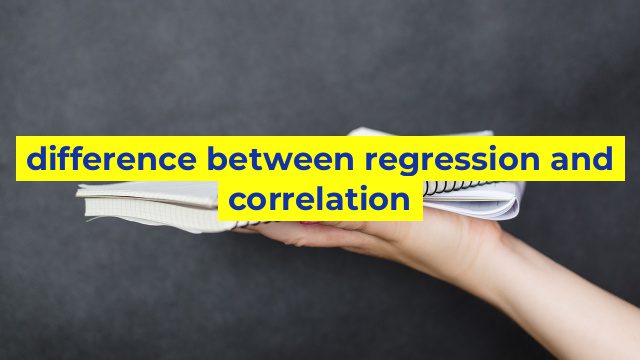Difference between regression and correlation
Regression and correlation are two statistical measures that are commonly used for analyzing and interpreting data. While they are related, they provide different kinds of information and have different uses in statistical analysis. In this article, we’ll explore the main differences between regression and correlation, and how they can be used in practice.
Correlation
Correlation is a statistical measure that describes the relationship between two variables. It is a way of measuring how closely related two variables are, and how well they move together. Correlation is typically measured using a correlation coefficient, which ranges from -1 to 1. A correlation coefficient of -1 indicates a perfect negative correlation, where one variable decreases as the other increases. A correlation coefficient of 1 indicates a perfect positive correlation, where both variables move in the same direction. A correlation coefficient of 0 indicates no correlation, where the variables are not related.
Correlation is often used to explore the relationship between variables, and to identify patterns or trends. It is commonly used in business and finance to identify relationships between economic variables such as stock prices and interest rates. It is also used in social sciences to explore relationships between demographic variables, such as age and income.
Regression
Regression is a statistical method used to analyze the relationship between two or more variables. It is used to make predictions about one variable based on the values of other variables. Regression involves fitting a line to the data points, which represents the relationship between the variables. The line is called the regression line, and it is used to make predictions about the dependent variable based on the independent variable.
There are two main types of regression: linear regression and logistic regression. Linear regression is used when the relationship between the variables is linear, while logistic regression is used when the relationship is nonlinear.
Regression is often used in business and finance to make predictions about future trends and to identify relationships between variables. It is also used in social sciences to explore relationships between variables, such as the relationship between education and income.
Differences between correlation and regression
While correlation and regression are closely related, there are some key differences between them. The main difference is that correlation measures the strength and direction of the relationship between two variables, while regression is used to make predictions about one variable based on the values of other variables.
Another difference is that correlation can be used with any type of data, while regression requires that the relationship between the variables is linear. In addition, correlation is a measure of association, while regression is a modeling technique.
In conclusion, correlation and regression are two important statistical measures that are commonly used in research and business. While they are related, they provide different kinds of information and have different uses in statistical analysis. By understanding the differences between these two measures, you can choose the right approach for your research and analysis needs.
Table difference between regression and correlation
| Regression | Correlation |
|---|---|
| Regression is a statistical method used to find the relationship between dependent and independent variables. | Correlation is a statistical method used to find the relationship between two variables. |
| Regression emphasizes the importance of the relationship between the dependent and independent variable. | Correlation does not emphasize the importance of any particular variable, rather it focuses on the overall relationship between two variables. |
| Regression can be used to make predictions based on the relationship between dependent and independent variables. | Correlation cannot be used to make predictions. |
| Regression can be used to identify the direction and magnitude of the relationship between dependent and independent variables. | Correlation can be used to identify the direction of the relationship between two variables but not the magnitude. |
| Regression has a dependent variable that is affected by independent variables. | Correlation does not have a dependent or independent variable, both variables are treated equally. |


